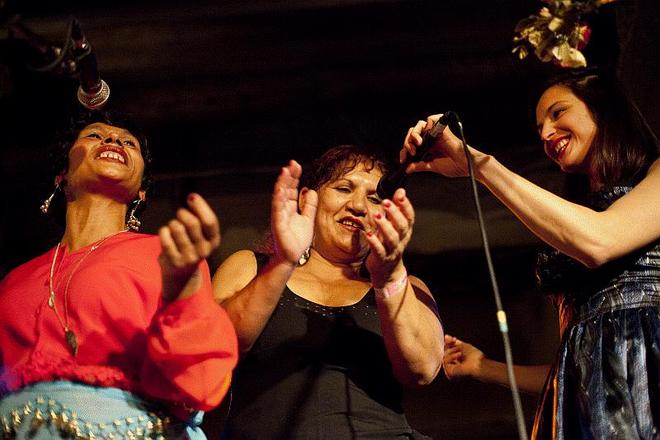IN SLOVAKIA, Roma music and especially Roma songs have quite a long and vivid tradition. During the twentieth century they started to fade into oblivion, even among Roma themselves, under the influence of pop and modern styles of music, but recently they have been revived and now seem to be regaining ever wider popularity. The afterPhurikane project strives to combine old Roma songs performed by untrained musicians with other influences, from classical to jazz and beyond.
Beginning in December a tour entitled Dromeha khere / Cestou domov / On the way home was organised under the afterPhurikane label. It brought together famous Slovak singer Jana Kirschner (who currently lives in the UK), Eddie Stevens (UK) on piano and electronic keyboard, Slovaks Jozef Lupták and Boris Lenko, on cello and accordion respectively, Thierry Ebam (from central Africa) on percussion, and Roma singers Marcelka and Jozef Dreveňáks, Irenka Pokutová, Béla Pokuta and Martinka Ďuďová.
The Konvergencie / Convergences festival in September saw the premiere of a joint performance by Jana Kirschner and Eddie Stevens, with the other musicians occasionally meeting to record or perform under the name afterPhurikane. At Convergences, as well as during the December tour, Kirschner mainly performed songs from her recent album Krajina rovina. Before the December tour, however, the performers gathered for a workshop at which they rehearsed several songs that they intended to sing together; in September, their performances were more like successive shows by two different bands.
Ethnologist Jana Belišová launched the whole project, originally as part of her research into ancient Roma songs (phurikane giľa means old songs in Roma), which resulted in three CDs. Later, she managed to put together a relatively cohesive group of Roma singers and tried to address professional musicians open to the idea of merging styles and trying new things in a project called afterPhurikane.
“I helped Janka [Belišová] to put together the CD of authentic Roma songs, when she asked me if I was willing to cooperate,” Jozef Lupták told The Slovak Spectator. “I tested the idea – so to say – at the launch of the original CD, and as I liked it I agreed to continue. And when I met another Janka – Kirschner – at a social occasion, we started talking about our projects and she became enthused by the idea of merging her music with ours. It took almost a year, though, for the idea to materialise.”
Ebam, the percussionist, said: “I love the idea of this project, as I think this is what this world lacks – that different people work together, everyone stays his or her own self, does not give up his or her own identity, but together, we create something new, a new quality. Without getting on anybody’s nerves, we all try to play rhythms and motifs that go well with the music of the others.”
After a successful series of concerts in smaller venues in Levoča, Košice and Martin, the tour culminated in a gig at the KC Dunaj cultural centre in Bratislava on December 7. The packed audience gradually warmed to the music and, in the end, was clapping, dancing and refusing to let the musicians leave the stage. “It is always like this, that after five, six songs, people start reacting, melting to the music and singing,” Belišová said after the concert. “Today, I felt it was the strongest. Janka [Kirschner] said it was a pity that the tour was over now, as it is going so smoothly and the next gigs would be perfect. But a Slovak proverb says that one should stop in the best moment.”
Rather than being a mere medley of old Roma songs, Slovak folklore, central-African melodies, reggae, and the chanson-like music of Jana Kirschner, the concert brought a new quality. But it may take some time for the music to develop more, crystallise and “find its way home”.



 Romasingers with Jana Kirschner (r). (source: Jarmila Uhlíková)
Romasingers with Jana Kirschner (r). (source: Jarmila Uhlíková)